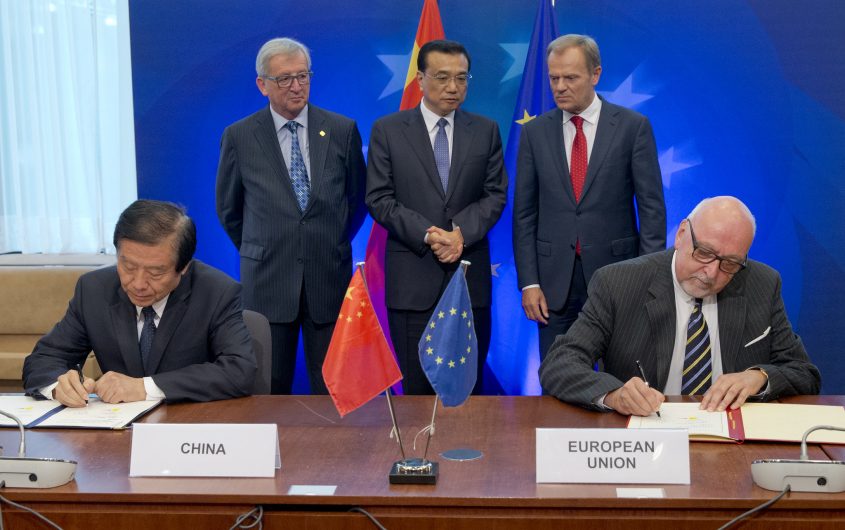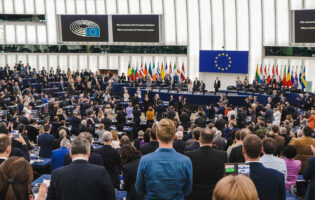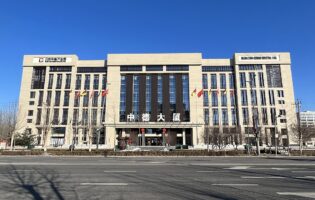
European External Action Service via Flickr
The Weaponization of Economic Policy on Both Sides of the Atlantic: Something’s Got to Give.

Henrike Lindemann
Federal Ministry for Economic Affairs and Energy
Henrike Lindemann is deputy head of the office of the Federal Minister for Economic Affairs and Energy Peter Altmaier (MP). In this capacity, Dr. Lindemann acts as advisor to the minister on political as well as operational matters. Prior to this, she worked as special advisor to Mr. Altmaier’s predecessor, the former Federal Minister Brigitte Zypries, and as deputy head of division within the ministry’s department for energy policy. She joined the ministry in 2012. She holds a PhD in economics from Ludwig-Maximilians-University in Munich.
Thanks to her current role, Dr. Lindemann has gained an in-depth understanding of the political negotiations that shape the geoeconomic relations between Germany and its European partners as well as between the European Union and third countries. A prime example are the current tensions in the field of trade policy between the EU and the United States, which have had a considerable impact on her daily work. Dr. Lindemann has fostered a personal relationship with the United States ever since her stay in California as an exchange student in 1997/1998.
She is a 2018-2019 participant in AICGS’ project “A German-American Dialogue of the Next Generation: Global Responsibility, Joint Engagement,” sponsored by the Transatlantik-Programm der Bundesrepublik Deutschland aus Mitteln des European Recovery Program (ERP) des Bundesministeriums für Wirtschaft und Energie (BMWi).
On July 25, 2018, Presidents Trump and Juncker agreed that the United States and the European Union should join forces to “protect American and European companies better from unfair global trade practices […] work closely together with like-minded partners to reform the WTO […and] address unfair trading practices, including intellectual property theft, forced technology transfer, industrial subsidies, distortions created by state-owned enterprises and overcapacity.” While this agreement was somewhat forced by Mr. Trump’s threat to impose further tariffs on imports from the EU, it was nevertheless drafted in a cooperative spirit.
However, what was already in the air then has become crystal clear a year later: the use of tit-for-tat tariffs between the U.S. and EU—but especially between the U.S. and China—goes far beyond Trump’s concern over trade balances. It is, rather, one way of claiming the position of economic superpower and the right to define the new economic world order and the United States is not going to go about it in a cooperative manner. The most recent move to that end being the U.S. Department of Commerce’s blacklisting of Huawei, thus barring American companies from selling certain technologies to them without prior government approval.
We seem to have reached a stage where policies are chosen from one of the two ends of the policy spectrum: all enter a “competitive system of deals forged by the leverage of raw economic power” or all must abide by WTO rules.
In fact, we seem to have reached a stage where policies are chosen from one of the two ends of the policy spectrum: all enter a “competitive system of deals forged by the leverage of raw economic power” or all must abide by WTO rules (with the dispute settlement mechanisms kicking into gear in case someone does not). Again, the Huawei ban is the perfect example of the former.
The EU (and Germany) are late to the game. Yet, it has become apparent that they still want to play: In 2016, the European Commission and the High Representative for Foreign Affairs jointly but still somewhat shyly acknowledged that, “Internal change in China has external impact. Economically and financially, in trade and investment flows, strategically, increasingly militarily and in other areas, China is seeking space and a voice. As a consequence, the decisions China makes about its political, economic and social development matter to the EU more than ever.” To boost trade and investment, “The EU aims to ensure reciprocity and a level playing field in all aspects of its trade and investment relationship with China. To that end, it will step up its monitoring of access to Chinese markets and to China’s R&D support schemes by European companies.”[1]
Three years later in 2019, the tone has become more assertive: “…there is a growing appreciation in Europe that the balance of challenges and opportunities presented by China has shifted. In the last decade, China’s economic power and political influence have grown with unprecedented scale and speed, reflecting its ambitions to become a leading global power. China can no longer be regarded as a developing country. It is a key global actor and leading technological power.” Therefore, the EU would take “Action 6: To promote reciprocity and open up procurement opportunities in China, the European Parliament and the Council should adopt the International Procurement Instrument before the end of 2019” as well as “Action 8: To fully address the distortive effects of foreign state ownership and state financing in the internal market, the Commission will identify before the end of 2019 how to fill existing gaps in EU law.”[2]
In addition, at national level in the EU, Germany, France, the UK, and Poland, among others, as well as the U.S. have recently put forward their own individual and/or joint industrial policy strategies. All of them more or less explicitly address the 800-pound panda in the room (China) and lay out policy options that tend to take a rather strong stance in terms of the state’s role in picking winners (e.g., “sector deals”), using public funds to fight off foreign takeovers, etc.[3]
The approaches toward the “China challenge” (still) differ markedly between the EU and the U.S. in terms of cooperation versus deal-making. Nevertheless, the common takeaway appears to be this: You cannot have the world’s largest economy or economic region, respectively, be capitalist and democratic systems and the second largest economy be a state-backed hybrid capitalist system ruled by a single party that pulls all the strings. The rules are so different that something’s got to give and, “So far, China has opened a bit more, and the U.S. has closed a bit more by way of increasing trade tariffs.” The same is true for the European Union, albeit perhaps to a lesser extent.
The Chinese model is not sustainable in the long term—neither economically nor societally.
In fact, some may think that we have reached a point of no return: for too long, the EU (Germany) and the U.S. have failed “to get their houses in order” so that there is no other way than to use aggressive and/or defensive economic policies. Indeed, public investment in infrastructure (roads, schools, fast internet, etc.) and agreeing on rules and regulations propelling innovation and international competitiveness may take a long time to carry out and an even longer time to show their positive effects. Hence, so the argument may go, if we do not “become more Chinese” we may lose the battle for economic frontrunner for good. Others argue that history has shown time and time again that states picking winners has never been a strategy crowned by success (just think of the demise of the Soviet Union or the economy of scarcity in the GDR).[4] I tend to agree with the latter: the Chinese model is not sustainable in the long term—neither economically nor societally. Therefore, I still believe the EU and the U.S. should make a coordinated effort to press the Chinese to create a level playing field. If not rooted in the common belief that multilateralism is the way to go, then this effort should at least be based on the conviction that autocracy and a centrally planned economy are not a route that either side of the Atlantic should go down.
[1] See European Commission and the High Representative for Foreign Affairs, 2016, Joint Communication to the European Parliament and the Council – Elements for a new EU strategy on China, 2016, JOIN(2016) 30 final, pp. 3 and 8.
[2] Joint Communication to the European Parliament, the European Council and the Council, EU-China – A strategic outlook, 2019, JOIN(2019) 5 final, pp.7 & 8.
[3] National Industry Strategy 2030, Federal Ministry for Economic Affairs and Energy (2019), Berlin; A Franco-German Manifesto for a European industrial policy fit for the 21st Century, Berlin/Paris (2019); Industrial Strategy – Building a Britain fit for the future, Presented to Parliament by the Secretary of State for Business, Energy and Industrial Strategy and by Command of Her Majesty, London (2017); European industrial policy for a strong and competitive economy, joint statement of the German Federal Ministry for Economic Affairs and Energy and the Polish Ministry of Entrepreneurship and Technology, Berlin (2019); Made in China 2025 and the Future of American Industry (2019), Report by Chairman Sen. Marco Rubio to the US Senate Committee on Small Business and Entrepreneurship.
[4] See, for example, Veronique de Rugy, “Why Are Republicans Embracing Economic State Planning?” The New York Times, March 5, 2019 and Jeromin Zettelmeyer, The Return of Economic Nationalism in Germany, Policy Brief 19-4 (March 2019), Peterson Institute for International Economics, Washington, DC.









